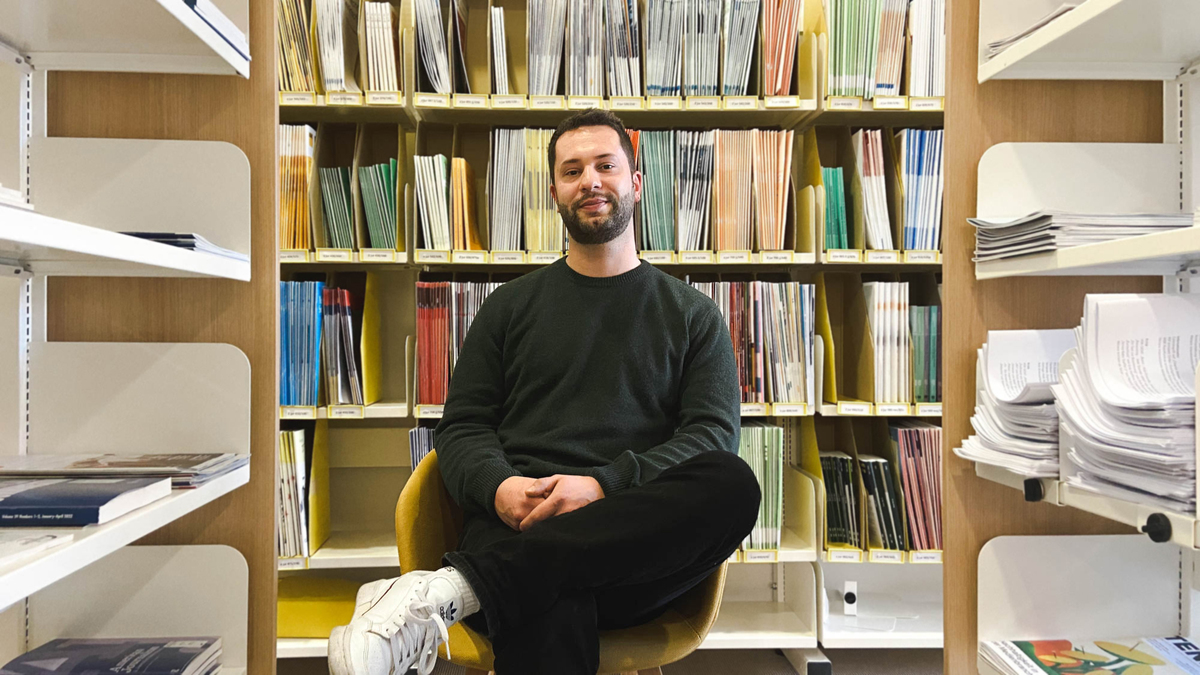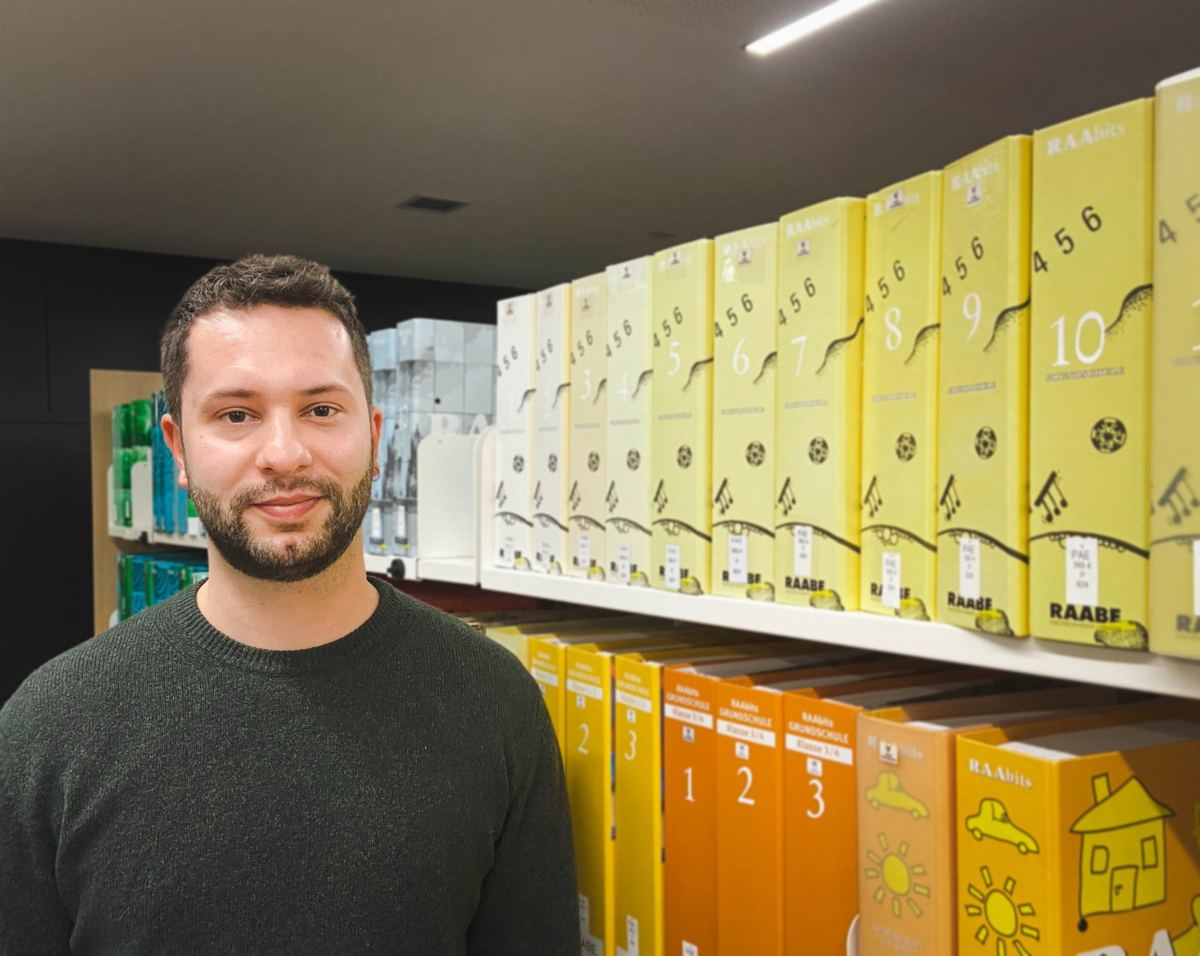
© Maria Bossauer / Universität Bremen
And Then? Providing Knowledge
In this series, we present Uni Bremen graduates and their careers. This time: Jacob Chilinski, trainee at the SuUB
Don’t you just reshelve books all day long at the library? That’s a question Jacob Chilinski often gets when he talks about his profession. The 28-year-old then enthusiastically explains just how complex library operations are and how important the work is for study and research. The University of Bremen graduate tells us about his journey from religious studies to a traineeship at the State and University Library (SuUB) Bremen.
What was your path to your current profession?
I did a double major in religious studies and history for my bachelor’s degree at the University of Bremen. I then completed a master’s degree in religious studies as a single major, with a focus on the sociology of religion. That involves looking at contemporary issues of religion and society. After graduating from high school, I did a voluntary year of social service in a Protestant parish, and that experience inspired me to choose my course of study. After completing my master’s degree, I wanted to work in the academic world, so I worked at the Institute for the Study of Religion with others on the study “Hostility to Islam in Christian Media.” Since October 1, I have been doing a traineeship as an academic librarian at the Bremen State and University Library.
What does such a traineeship in a library entail?
This traineeship is combined with a two-year master’s degree. I’m doing the theoretical part at the Humboldt-Universität zu Berlin as a distance-learning course in the master’s program in Library and Information Science. The practical part takes place at the SuUB library – almost like a dual course of study. This means that I take exams and write a master’s thesis, and go through several “stations” that are part of the library’s day-to-day operations – like the library classification system, cataloging, and working at the information desk. Of course, it also includes more complex tasks such as working on various projects and also with the subject-area departments, which ensure that each faculty has the literature it needs. The latter, for example, is also a specific job that I can pursue after completing my traineeship. During the traineeship, you are a civil servant on revocation – that’s what temporary civil servant status is called – until you have passed the final examination for your profession. And I get a so-called candidate’s salary. Another advantage is that I don’t have to pay for the distance-learning part myself. I can also attend professional development courses and intern at other libraries.

© Maria Bossauer / Universität Bremen
What was a decisive motivation for you in choosing this career?
After finishing my studies, I wanted to stay in the world of academia and was looking around for jobs in that area. In doing so, I came across the possibility of a traineeship. It was exciting for me to realize that the library is often forgotten about as a scientific institution, because it’s not directly about research or knowledge acquisition like a university or a research center, but is rather about making knowledge available. In the process, a large part of the knowledge transfer takes place in a library, for example to students. Knowledge is also expensive. In the library, this barrier is being broken down in order to make knowledge accessible to as many people as possible. I am particularly interested in topics like open access and open data. The first one is about making publications freely accessible. The second is about the transparent provision of research data for further research. Academic librarians are currently in high demand, as the library is currently undergoing a transformation towards digitization.
What would you say to students who want to set off into the working world?
If you are interested in a career in academic libraries, you should not be deterred by technology. That may sound surprising at first. Libraries, however, work with huge amounts of data and metadata-management systems for cataloging. The SuUB, for instance, has over 100 million data sets of media in its system, all of which have to be searched and the correct results filtered within seconds. I also think it’s important to try things out yourself in order to be able to better find your place in the world. I had a variety of part-time jobs, such as working as a student assistant at the Institute for the Study of Religion, and I also worked at the library on the side. When it comes to job applications, most people look at precisely those practical experiences and don’t usually ask about things like your second-semester term paper.
Interested in a library traineeship?
Can you see yourself doing a traineeship at a library? The positions for academic librarian traineeships are advertised centrally for Lower Saxony, Bremen, and Hamburg by the Gottfried Wilhelm Leibniz Library in Hanover (both websites in German).
This year, applications for positions in Lower Saxony will be accepted until February 16, 2023. The next job opening for a traineeship at the Bremen State and University Library will be in 2024. The prerequisite to apply is a completed master’s degree.
For more information on the traineeship program, please visit the Gottfried Wilhelm Leibniz Library website (in German).
For general information about the profession, please visit the Association of German Librarians’ website and that of the Berufsverband Information Bibliothek e.V. (in German).